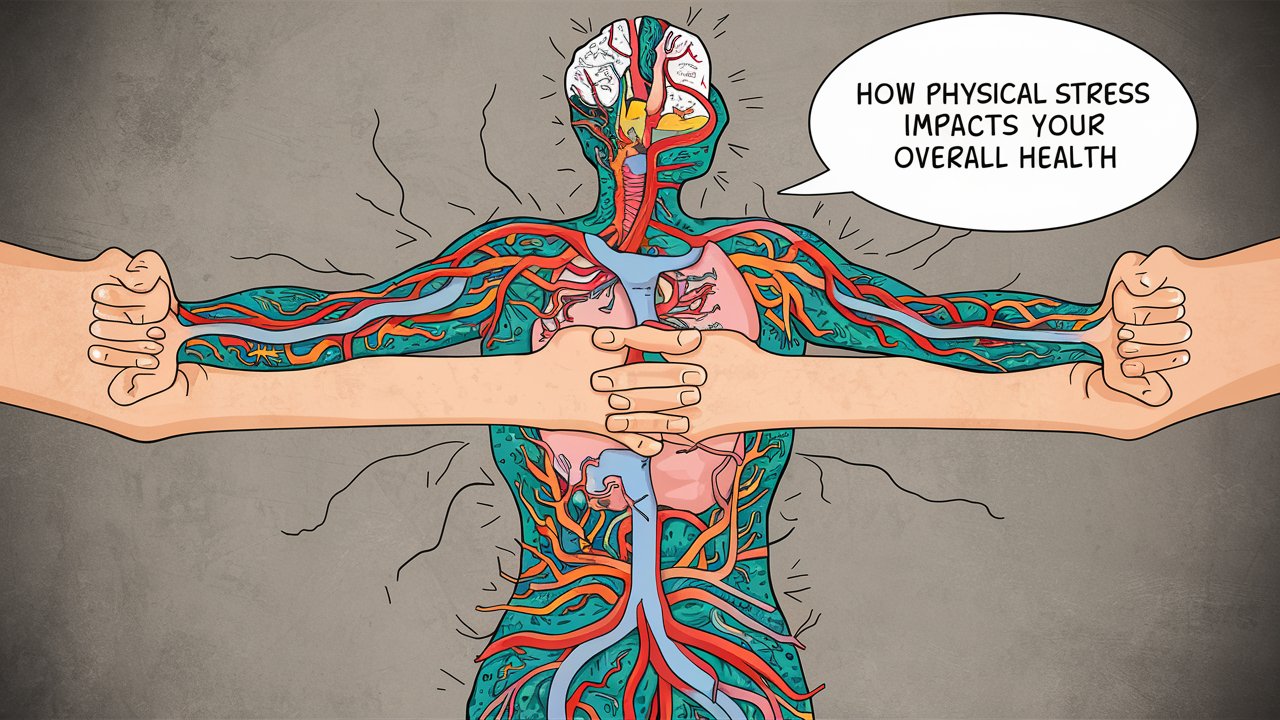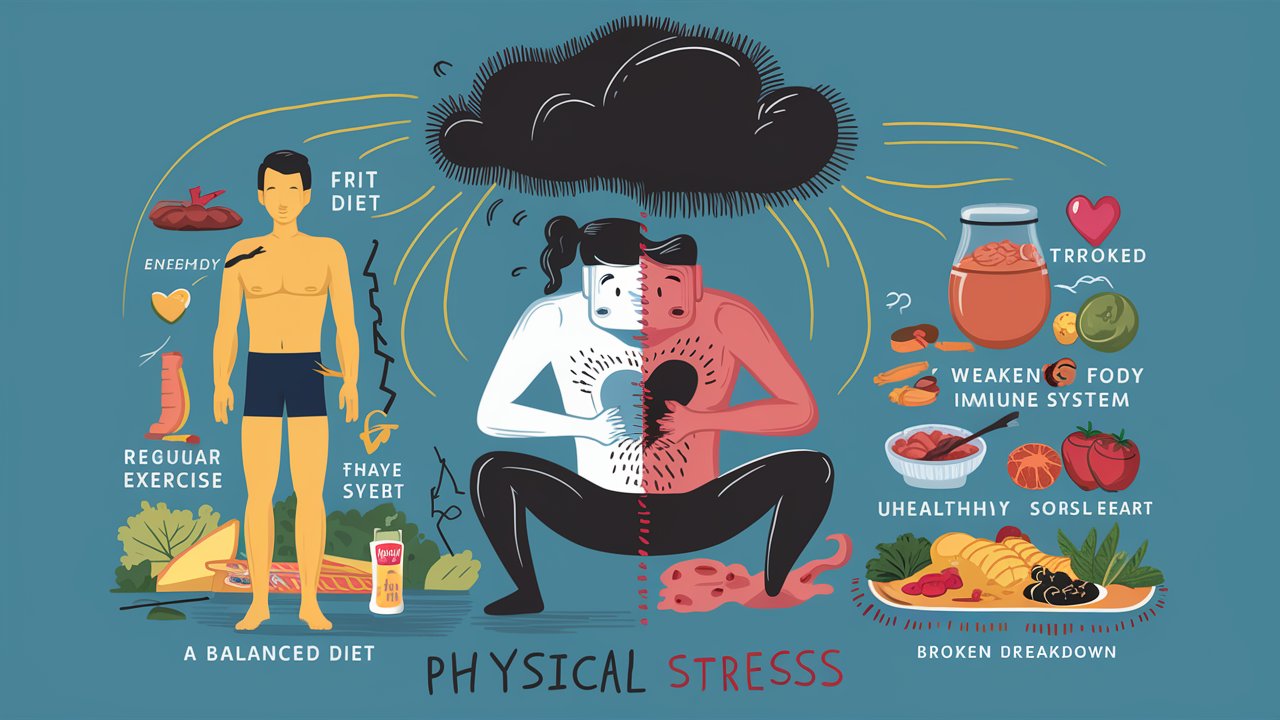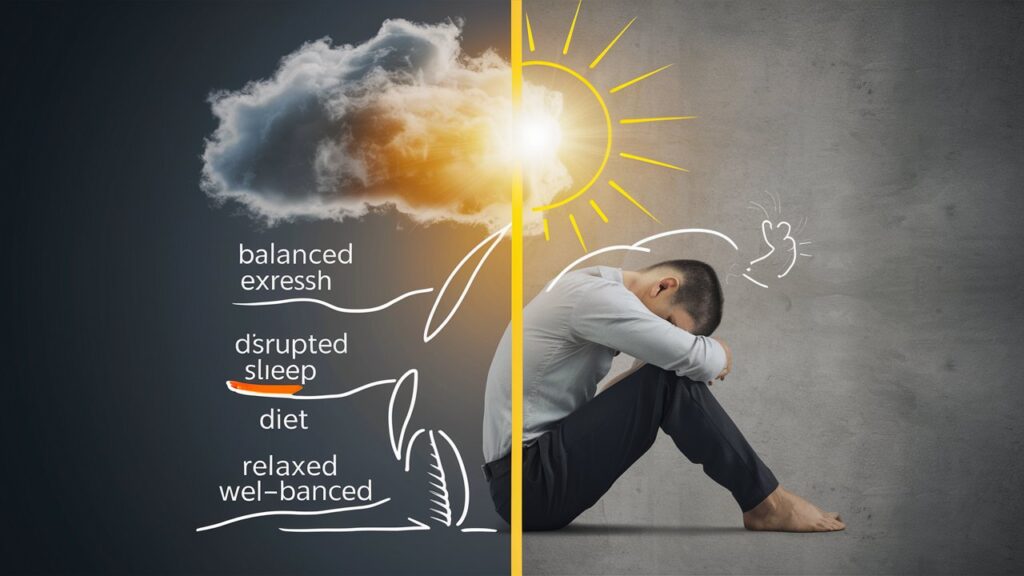In 2024, the impact of physical stress on overall health is a topic of paramount importance. With the rapid advancements in technology and an ever-increasing pace of life, understanding how stress affects our bodies is crucial for maintaining optimal health and well-being.
Understanding Physical Stress
Physical stress refers to the body’s response to demands or threats that disrupt its natural state of balance, also known as homeostasis. These demands can be external, such as strenuous physical activity, or internal, such as chronic illnesses. The body reacts to stress through a complex set of physiological changes involving the nervous, endocrine, and immune systems.
The Physiological Response to Stress
When faced with stress, the hypothalamus activates the sympathetic nervous system, triggering the release of adrenaline and cortisol from the adrenal glands. This response, known as the fight-or-flight response, prepares the body to either confront or flee from the stressor. While this response is beneficial in short bursts, chronic activation can lead to significant health issues.
Short-Term vs. Long-Term Stress
- Short-Term Stress: Short-term stress, such as that experienced during a workout or a challenging situation, can be beneficial. It enhances alertness, improves performance, and strengthens the cardiovascular and musculoskeletal systems.
- Long-Term Stress: Chronic stress, however, has detrimental effects. Prolonged exposure to high levels of cortisol can lead to numerous health problems, including hypertension, heart disease, diabetes, and mental health disorders.
Impact on Cardiovascular Health
One of the most significant impacts of physical stress is on cardiovascular health. Chronic stress leads to elevated blood pressure and heart rate, increasing the risk of hypertension and cardiovascular diseases. The persistent release of stress hormones causes inflammation in the arteries, which can result in atherosclerosis (hardening of the arteries) and increase the risk of heart attacks and strokes.

Stress and Hypertension
Stress-induced hypertension is a major health concern. When the body is constantly in a state of heightened alert, the blood vessels remain constricted, leading to sustained high blood pressure. Over time, this can damage the blood vessel walls and contribute to the development of cardiovascular diseases.
Effects on the Immune System
Physical stress significantly impacts the immune system. While short-term stress can boost the immune response, chronic stress suppresses it, making the body more susceptible to infections and illnesses. Elevated cortisol levels inhibit the production of cytokines, which are crucial for an effective immune response. This suppression can lead to increased vulnerability to viruses, bacteria, and other pathogens.
Autoimmune Disorders
Prolonged stress can also exacerbate autoimmune disorders, where the immune system mistakenly attacks healthy cells. Conditions such as rheumatoid arthritis, lupus, and multiple sclerosis can worsen with chronic stress, leading to more severe symptoms and complications.
Mental Health Consequences
The link between physical stress and mental health is well-documented. Chronic stress can lead to various mental health issues, including anxiety, depression, and insomnia. The constant activation of the stress response can disrupt the balance of neurotransmitters in the brain, leading to mood disorders and cognitive impairments.
Anxiety and Depression
The relationship between stress and anxiety is cyclical. Stress increases anxiety levels, and anxiety, in turn, heightens the perception of stress. This vicious cycle can lead to chronic anxiety disorders. Similarly, stress can trigger depressive episodes by affecting the production of serotonin, a neurotransmitter crucial for mood regulation.
Cognitive Impairments
Chronic stress can impair cognitive functions such as memory, attention, and decision-making. High cortisol levels can damage the hippocampus, the brain region responsible for learning and memory. This can result in difficulties with concentration, forgetfulness, and a decrease in overall cognitive performance.
Impact on Digestive Health
Physical stress affects the digestive system in multiple ways. It can cause gastrointestinal issues such as irritable bowel syndrome (IBS), acid reflux, and peptic ulcers. The gut-brain axis, a bidirectional communication system between the gut and the brain, plays a crucial role in how stress impacts digestive health.
Irritable Bowel Syndrome (IBS)
Stress is a known trigger for IBS, a condition characterized by abdominal pain, bloating, and altered bowel habits. The exact mechanism is not fully understood, but stress-induced changes in gut motility and sensitivity are believed to play a role.

Acid Reflux and Ulcers
Stress can increase stomach acid production, leading to acid reflux and exacerbating conditions like gastroesophageal reflux disease (GERD). Additionally, stress can impair the stomach’s protective lining, making it more susceptible to ulcers caused by stomach acid and Helicobacter pylori bacteria.
Musculoskeletal Problems
The musculoskeletal system is not immune to the effects of physical stress. Chronic stress can lead to muscle tension, pain, and injuries. Stress-induced muscle tension often manifests in the neck, shoulders, and back, contributing to chronic pain conditions.
Tension Headaches and Migraines
Stress is a common trigger for tension headaches and migraines. The exact cause is not fully understood, but it’s believed that stress-induced muscle tension and changes in blood flow to the brain play a significant role.
Hormonal Imbalances
Stress disrupts the balance of various hormones in the body, leading to hormonal imbalances. These imbalances can affect reproductive health, metabolism, and overall well-being.
Reproductive Health
In women, chronic stress can lead to menstrual irregularities, reduced fertility, and complications during pregnancy. In men, stress can result in reduced testosterone levels, leading to decreased libido and fertility issues.
Metabolic Disorders
Stress affects metabolism by influencing the way the body processes and stores energy. Chronic stress can lead to weight gain, obesity, and an increased risk of metabolic disorders such as type 2 diabetes. Elevated cortisol levels promote the accumulation of abdominal fat, which is particularly harmful to metabolic health.
Strategies to Manage Physical Stress
Managing physical stress is crucial for maintaining overall health. Here are some effective strategies:
Regular Exercise
Engaging in regular physical activity can help reduce stress levels. Exercise releases endorphins, the body’s natural stress relievers, and helps improve mood and overall well-being.
Healthy Diet
A balanced diet rich in fruits, vegetables, lean proteins, and whole grains can support the body’s ability to cope with stress. Avoiding excessive caffeine, sugar, and processed foods is also beneficial.
Adequate Sleep
Getting sufficient sleep is essential for stress management. Sleep allows the body to repair and regenerate, reducing the physical and mental toll of stress.
Mindfulness and Relaxation Techniques
Practicing mindfulness, meditation, and deep-breathing exercises can help calm the mind and reduce stress levels. These techniques promote relaxation and improve resilience to stress.
Social Support
Having a strong support system of family and friends can provide emotional comfort and reduce the impact of stress. Social interactions and connections are vital for mental health.

Professional Help
In cases of chronic stress, seeking professional help from a therapist or counselor can be beneficial. Cognitive-behavioral therapy (CBT) and other therapeutic approaches can help manage stress and improve coping skills.
Conclusion
The impact of physical stress on overall health in 2024 is profound and multifaceted. Understanding how stress affects various bodily systems and implementing effective stress management strategies are crucial for maintaining health and well-being. By addressing the root causes of stress and adopting healthy lifestyle practices, we can mitigate the negative effects of stress and promote a healthier, more balanced life.








